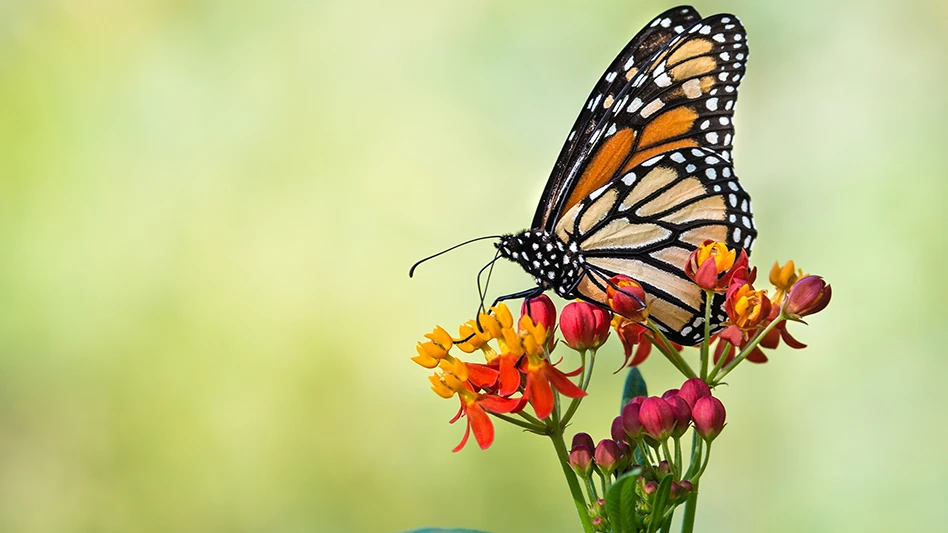

Approximately 1 million species worldwide are facing extinction, according to an independent report supported by the United Nations. Among them: polar bears, sea turtles, Asian elephants, giraffes, seaweed, oak trees, and monarch butterflies.
“The current biodiversity crisis will be exacerbated with catastrophic results unless humans interact with nature in a more sustainable way,” according to the report.
The plight of polar bears, sea turtles, Asian elephants, and seaweed may be beyond the purview of most superintendents and course operators. But the fight to save the monarch, that delicate flutter of orange or yellow weighing less than one gram, now that’s a battle that can be waged in golf’s own backyard.
The monarch population has declined 85 percent in two decades. The western population — which overwinters in California as part of its international migration — has suffered a heartbreaking 99 percent decline. Overall, the migrating populations are less than half the size they need to be to avoid extinction.
The monarchs’ decline can be traced to a confluence of factors: climate change, urban development, and pesticides, including toxic neonicotinoids and herbicides, which are killing off milkweed plants, the only plants that monarch caterpillars eat. Most monarchs fly north from central Mexico in spring and summer, landing in the central and eastern parts of the United States. During this migration, adult female monarchs lay eggs only on milkweed plants. When the eggs hatch, the resulting larvae feed on milkweed leaves. Suffice to say, milkweed plants are critical to the butterfly’s lifecycle.
Audubon International, with start-up help from the Environmental Defense Fund, has taken up the fight to save the monarch by enlisting the help of golf courses, which occupy approximately 2.5 million acres in the U.S. alone. To combat the decline of milkweed and other key pollinators that monarchs need to survive, golf courses are encouraged to restore pollinator habitat in out-of-play areas through a program called Monarchs in the Rough. The program’s focus, according to Audubon CEO Christine Kane, is to “increase support for, as well as awareness of, the golf sector’s contribution to the monarch conservation challenge.”
The program’s chief ally is the course superintendent.
“When you need to get something done, environmentally speaking, call on the golf course superintendents,” Kane says. “They are terrific environmental stewards.”
Since the program’s inception in 2018, some 800 golf properties have committed more than 1,200 acres to creating new plantings of the milkweed plants these butterflies need to survive.
Thanks to an initial grant from the National Fish and Wildlife Foundation and matching funds from the United States Golf Association, Monarchs in the Rough provided regionally appropriate milkweed and wildflower mixes, along with technical assistance and scientific expertise, to superintendents on how to create, protect and maintain milkweed and other native habitat. Today, courses can join and obtain milkweed seed from Audubon International and be a part of the pollinator solution at www.monarchsintherough.org.
Monarchs, which are thought to be the only true migratory butterfly on Earth, are not the only beneficiaries of the program and other efforts to save the regal insect from extinction.
By making golfers, community residents and local officials aware of their participation in the Monarchs in the Rough program and their commitment to sustainability, courses earn recognition in their communities as environmental leaders. The new wildflowers also contribute to a course’s natural beauty and golfers’ enjoyment.
While the benefits of the project are tangible for butterflies, biodiversity, and golfers, the next efforts will focus on demonstrating pest management and potential economic advantages for golf courses that actively plant and preserve native habitat.
As another election season begins to heat up in our country, the golf community might rally around a non-partisan campaign slogan: “Milkweed for Monarchs!”
Get curated news on YOUR industry.
Enter your email to receive our newsletters.
Explore the May 2023 Issue
Check out more from this issue and find your next story to read.
Latest from Golf Course Industry
- Carolinas GCSA raises nearly $300,000 for research
- Advanced Turf Solutions’ Scott Lund expands role
- South Carolina’s Tidewater Golf Club completes renovation project
- SePRO to host webinar on plant growth regulators
- Turfco introduces riding applicator
- From the publisher’s pen: The golf guilt trip
- Bob Farren lands Carolinas GCSA highest honor
- Architect Brian Curley breaks ground on new First Tee venue






